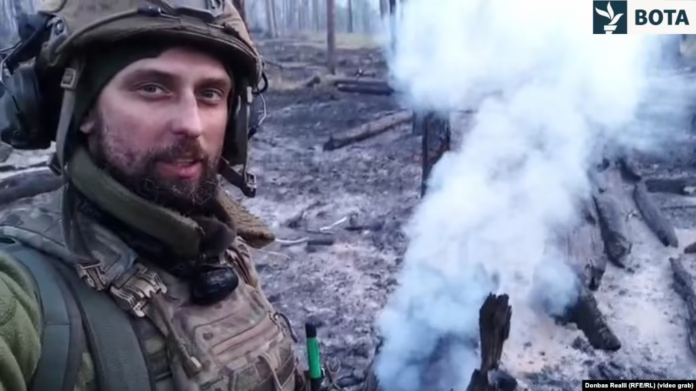Ballet was his life before the war. Now, Sergeant Oleksandr Dushakov is a soldier in a unit of the Ukrainian National Guard, deployed near the combat zone in the east of the country.
“I was a ballet dancer. Actually, officially I still am. I’ve practiced it since my childhood; it’s a family tradition,” Dushakov told Radio Free Europe/Radio Liberty (RFE/RL) in an interview in a forest clearing not far from Kupiansk, a city in the Kharkiv region which is under heavy pressure from Russian forces.
“My grandparents were dancers. Even my mother would have danced, but she had poor eyesight and at that time there were no contact lenses, so she became an accompanist pianist… And she herself is a dancer. My wife is a dancer. Even my daughter is already a dancer,” Dushakov explained.
Dushakov, 41, is one of the hundreds of thousands of Ukrainians from different professions and backgrounds who voluntarily joined the military after Russia launched its invasion of their country on February 24, 2022.
On that morning, he was in Paris for a performance. He had arrived one day earlier and spent the whole night awake, worried about his family in Kyiv.
“I remember their first messages. It was very frightening, because seeing the war from afar is even worse,” he emphasized.
“I couldn’t just sit and do nothing”
Later, his wife and daughter left for Vilnius, while he returned to Kyiv in March, at a time when Ukrainian forces began pushing Russian troops away from the outskirts of the capital, crushing Putin’s hope for a swift victory and paving the way for a prolonged war.
Dushakov first went to the recruitment office, where “they took my information and told me they would call. But they never did,” he said.
“I couldn’t just sit and do nothing, so I started helping as a volunteer, clearing rubble after bombings. Soon the theater reopened, and I returned to my profession as a ballet dancer at the Kyiv Municipal Academic Opera and Ballet Theater for Children and Youth,” he explained.
However, he also joined the civilian Territorial Defense units formed after the start of the invasion, and by spring 2023 he transitioned into the army, joining a unit of the National Guard near an area “where I have gathered mushrooms all my life.”
“I completed several training courses, and in the fall our brigade entered combat” in a forest along the border between the Luhansk and Donetsk regions of Donbas, he told RFE/RL.
“I spent nine months there,” Dushakov noted.
“The power of adrenaline”
The first weeks and months were tough for Dushakov, who had never held a weapon before.
“It was a difficult adjustment period on the front for a fighter who had never fought,” he said.
But he found strength in the forest, something he has “adored” since childhood.
“In the moments of psychological breakdown, when it felt like everything was over, it was the forest that supported me. I perceived it as a living being. It told me when to move, when not to move, where to go, where not to go. And the proof of that is the fact that I am still alive,” he stressed.
When asked if his ballet training helped him in the war, his answer was firm: “Of course.”
“Coordination, the ability to use exactly as much strength as needed when necessary. And another very important point, as an artist, I know the power of adrenaline, because when you go on stage for a role and you are very nervous, adrenaline kicks in,” he said.
He attributes his survival to both luck and good military training, something often lacking in the Ukrainian Armed Forces, partly because many experienced instructors have been killed or are serving on the front line.
“I was lucky to survive the first week, the second week, the third week,” he said.
Some of his comrades were not so lucky.
Dushakov did not provide details about those killed or injured in his unit, and Kyiv does not reveal official casualty numbers. Still, the Center for Strategic and International Studies (CSIS) estimated in June that between 60,000 and 100,000 Ukrainian soldiers have been killed since February 2022.
“Strong and good people die”
Dushakov admitted that he has somewhat become accustomed to the death of people around him, and this feeling disturbs him.
“There are people who take it very hard, and there are others who make you angry because they don’t seem to care at all,” he told RFE/RL.
“Of course, it is tragic that strong and good people die. But part of me has already accepted the fact that this is war, and in war people are killed. No one is immune to that,” he emphasized.
Dushakov wants to return to ballet after the war, but he does not have much hope, “because I don’t see any finish line.”
“When I joined the army, we all lived with the hope that the war would end quickly. But the more time passes, the more I understand that this is an equation with many unknowns. And I am already at an age where in my profession I could retire,” he added.
“I’ve been in ballet since childhood. It is in my blood. But give it a little more time, and the army will be in my blood as well,” he concluded.


